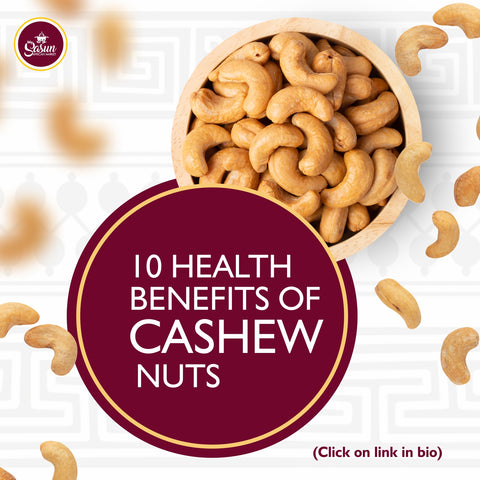Cashew nuts are a powerhouse of essential nutrients. They provide a mix of healthy fats, proteins, vitamins, and minerals. A 1-ounce (28-gram) serving of cashews contains about 157 calories, 5 grams of protein, 13 grams of fat, 8 grams of carbohydrates, and 1 gram of fiber. Cashew nuts are often enjoyed as a crunchy snack, and they offer a host of health benefits due to their rich nutritional profile. In this article, we'll delve into the many ways cashew nuts can contribute to your overall well-being.

HEALTH BENEFITS OF CASHEW NUTS
1. Improve heart health: Cashew nuts are a good source of monounsaturated and polyunsaturated fats, which can help to lower cholesterol levels and reduce the risk of heart disease. Cashew nuts are also a good source of magnesium and potassium, which are both important for heart health.
2. Promote weight management: Cashew nuts are a good source of protein and fiber, which can help you to feel full and satisfied after eating. This can help you to eat fewer calories overall, which can lead to weight loss or maintenance.
3. Control blood sugar levels: Cashew nuts have a low glycemic index, which means that they don't cause a sharp spike in blood sugar levels after eating. This makes them a good snack choice for people with diabetes or prediabetes.
4. Boost brain function: Cashew nuts are a good source of copper, which is essential for brain development and function. Cashew nuts also contain antioxidants, which can help to protect the brain from damage.
5. Strengthen bones and teeth: Cashew nuts are a good source of magnesium, which is important for bone health. Cashew nuts also contain calcium and phosphorus, which are both essential for strong bones and teeth.
6. Rich in Antioxidants: Cashews contain antioxidants like vitamin E and zinc. Antioxidants help combat oxidative stress, reducing the risk of chronic diseases and promoting overall health.
7. Supports Eye Health: The presence of antioxidants, particularly in the form of zeaxanthin, can benefit eye health. Zeaxanthin helps protect against age-related macular degeneration and may contribute to better vision.
8. Aids in Digestion: Cashews contain dietary fiber, which is essential for healthy digestion. Fiber helps prevent constipation and promotes a healthy gut microbiome.
9. Potential Cancer Prevention: Cashew nuts contain proanthocyanidins, a flavonol associated with inhibiting cancer cell replication. Additionally, the presence of copper and other minerals may reduce the risk of colon cancer, suggesting that cashew nut consumption might have anti-cancer properties. However, more research is needed to confirm these claims.
10. Support for Hemoglobin Production: Hemoglobin is a crucial protein for oxygen transport by red blood cells. Iron and copper are vital micronutrients for hemoglobin formation, and cashew nuts are rich in both. Furthermore, consuming cashew nuts could aid in managing blood disorders. Nevertheless, scientific ev
Here are a few ways to incorporate cashew nuts into your diet:
- Add a handful of cashew nuts to your breakfast cereal, garri, pap or oatmeal.
- Snack on cashew nuts throughout the day.
- Add crushed cashew nuts to salads, stir-fries, and other savory dishes.
- Use cashew nuts to make cashew milk, cashew butter, and other cashew-based products.
Cashew nuts are a delicious and nutritious snack that can offer a number of health benefits. Enjoy them in moderation as part of a healthy diet.
Rounding Off:
Cashew nuts, with their unique combination of nutrients, are not only a delightful snack but also a valuable addition to a balanced diet. From heart health to weight management and much more, these nuts offer numerous health benefits. Remember, moderation is key when incorporating cashews into your diet, as they are calorie-dense. A small handful a day can go a long way in reaping the advantages of this nutritious nut.







Comments (10)
How I got rid of human papilloma virus with natural treatment. i was diagnosed with this virus for 5 years i broke up with my boyfriend because i contracted the virus from him, luckily i found a herbalist name Dr. Ogedegbe everyone testify good of his natural treatment i picked up his address and contacted him. he truly treated me with natural herbs in a week and i got cured. I share this post because ever since i got this treatment I’m perfectly ok with my health, you can get contact with him through his email address dr.ogedegbe6@gmail.com or whatsapp +2349121737553.
“In the crypto world, this is great news I want to share. Last year, I fell victim to a scam disguised as a safe investment option. I have invested in crypto trading platforms for about 10yrs thinking I was ensuring myself a retirement income, only to find that all my assets were either frozen, I believed my assets were secure — until I discovered that my BTC funds had been frozen and withdrawals were impossible. It was a devastating moment when I realized I had been scammed, and I thought my Bitcoin was gone forever, Everything changed when a close friend recommended the Capital Crypto Recover Service. Their professionalism, expertise, and dedication enabled me to recover my lost Bitcoin funds back — more than €560.000 DEM to my BTC wallet. What once felt impossible became a reality thanks to their support. If you have lost Bitcoin through scams, hacking, failed withdrawals, or similar challenges, don’t lose hope. I strongly recommend Capital Crypto Recover Service to anyone seeking a reliable and effective solution for recovering any wallet assets. They have a proven track record of successful reputation in recovering lost password assets for their clients and can help you navigate the process of recovering your funds. Don’t let scammers get away with your hard-earned money – contact Email: Recoverycapital@fastservice.com
Phone CALL/Text Number: +1 (336) 390-6684 Contact: Capitalcryptorecover@zohomail.com
Website: https://recovercapital.wixsite.com/capital-crypto-rec-1
“In the crypto world, this is great news I want to share. Last year, I fell victim to a scam disguised as a safe investment option. I have invested in crypto trading platforms for about 10yrs thinking I was ensuring myself a retirement income, only to find that all my assets were either frozen, I believed my assets were secure — until I discovered that my BTC funds had been frozen and withdrawals were impossible. It was a devastating moment when I realized I had been scammed, and I thought my Bitcoin was gone forever, Everything changed when a close friend recommended the Capital Crypto Recover Service. Their professionalism, expertise, and dedication enabled me to recover my lost Bitcoin funds back — more than €560.000 DEM to my BTC wallet. What once felt impossible became a reality thanks to their support. If you have lost Bitcoin through scams, hacking, failed withdrawals, or similar challenges, don’t lose hope. I strongly recommend Capital Crypto Recover Service to anyone seeking a reliable and effective solution for recovering any wallet assets. They have a proven track record of successful reputation in recovering lost password assets for their clients and can help you navigate the process of recovering your funds. Don’t let scammers get away with your hard-earned money – contact Email: Recoverycapital@fastservice.com
Phone CALL/Text Number: +1 (336) 390-6684 Contact: Capitalcryptorecover@zohomail.com
Website: https://recovercapital.wixsite.com/capital-crypto-rec-1
“In the crypto world, this is great news I want to share. Last year, I fell victim to a scam disguised as a safe investment option. I have invested in crypto trading platforms for about 10yrs thinking I was ensuring myself a retirement income, only to find that all my assets were either frozen, I believed my assets were secure — until I discovered that my BTC funds had been frozen and withdrawals were impossible. It was a devastating moment when I realized I had been scammed, and I thought my Bitcoin was gone forever, Everything changed when a close friend recommended the Capital Crypto Recover Service. Their professionalism, expertise, and dedication enabled me to recover my lost Bitcoin funds back — more than €560.000 DEM to my BTC wallet. What once felt impossible became a reality thanks to their support. If you have lost Bitcoin through scams, hacking, failed withdrawals, or similar challenges, don’t lose hope. I strongly recommend Capital Crypto Recover Service to anyone seeking a reliable and effective solution for recovering any wallet assets. They have a proven track record of successful reputation in recovering lost password assets for their clients and can help you navigate the process of recovering your funds. Don’t let scammers get away with your hard-earned money – contact Email: Recoverycapital@fastservice.com
Phone CALL/Text Number: +1 (336) 390-6684 Contact: Capitalcryptorecover@zohomail.com
Website: https://recovercapital.wixsite.com/capital-crypto-rec-1
“In the crypto world, this is great news I want to share. Last year, I fell victim to a scam disguised as a safe investment option. I have invested in crypto trading platforms for about 10yrs thinking I was ensuring myself a retirement income, only to find that all my assets were either frozen, I believed my assets were secure — until I discovered that my BTC funds had been frozen and withdrawals were impossible. It was a devastating moment when I realized I had been scammed, and I thought my Bitcoin was gone forever, Everything changed when a close friend recommended the Capital Crypto Recover Service. Their professionalism, expertise, and dedication enabled me to recover my lost Bitcoin funds back — more than €560.000 DEM to my BTC wallet. What once felt impossible became a reality thanks to their support. If you have lost Bitcoin through scams, hacking, failed withdrawals, or similar challenges, don’t lose hope. I strongly recommend Capital Crypto Recover Service to anyone seeking a reliable and effective solution for recovering any wallet assets. They have a proven track record of successful reputation in recovering lost password assets for their clients and can help you navigate the process of recovering your funds. Don’t let scammers get away with your hard-earned money – contact Email: Recoverycapital@fastservice.com
Phone CALL/Text Number: +1 (336) 390-6684 Contact: Capitalcryptorecover@zohomail.com
Website: https://recovercapital.wixsite.com/capital-crypto-rec-1
HOW I RECOVER $850 FROM FAKE INVESTMENT BROKER ONLINE
I’m grateful to THE HACK ANGELS RECOVERY EXPERT for helping me recover my stolen Bitcoin. After losing funds to a fake platform, I felt hopeless. I am deeply grateful for their support. If you have fallen victim to a Bitcoin scam or any other form of cryptocurrency fraud, don’t give up. Reach out to THE HACK ANGELS RECOVERY EXPERT Contact:
WhatsApp (+1(520)200-2320
Email at support@thehackangels.com
Website at www.thehackangels.com
If you’re in London, you can even visit them in person at their office located at 45-46 Red Lion Street, London WC1R 4PF, UK.
HIRE THE TOP CRYPTO & BITCOIN RECOVERY EXPERTS THE HACK ANGELS
I have always thought it would be impossible to recover stolen cryptocurrency funds until I came across a hacker called THE HACK ANGELS RECOVERY EXPERT. Thanks to their expertise and dedication. If you’ve lost Bitcoin due to a wrong transaction, hacking, or forgotten private keys, THE HACK ANGELS RECOVERY EXPERT is here to help. If they could recover my $820,000 there’s hope for you too. I highly endorse their services to anyone looking to have their funds traced and recovered. You can get in touch with them through their Contact
WhatsApp (+1(520)200-2320
Email at support@thehackangels.com
Website at www.thehackangels.com
If you’re in London, you can even visit them in person at their office located at 45-46 Red Lion Street, London WC1R 4PF, UK.
Am here to let the whole world know that I was diagnose of herpes 3 years ago where all hope was lost and I had nothing to do about it,I just accepted the faith that one day I will cure of this disease and I just pray everyday for a helper and one day my sister introduce me to a herbal doctor man called Dr ahonsie that she saw him on internet well I contact him on his email,I was not fully convinced until he sent me the herbal medicine which he ask me to take for two weeks I took it with faith and i went for a retest in different hospitals and today am cured of this disease and am also using this medium to let all those having STD,like herpes and the rest not to give up,their is a man who can cure you,his name is Dr ahonsie . contact the great herbalist via his Email: drahonsie00@gmail.com / WhatsApp: +2348039482367. https://drahonsie002.wixsite.com/dr-ahonsie
I thought the physicians says there is no cure for HSV 2!!! I am telling you today that Dr ahonsie cure HSV 2 with his herbal medicine and once you get cured you are cured forever it is never reversible, I have been suffering for this deadly disease called h HSV 2 for more than a 2years and lost all hope because my doctor says there is no cure for HSV 2. Brethren I saw a testimony on the internet on how Dr ahonsie cure HSV, Hapatitis etc with his herbal medication and an email and watsapp to contact him was also displayed, I thought this was joke but I decided to contact him and he replied telling me not to worry that my problem is over . Dr ahonsie sent me a herbal medication to drink for one month but only 2weeks I feel strange and I went to my doctor and he confirmed me negative. He can help you too. Contact him drahonsie00@gmail.com or whatsapp +2348039482367 https://drahonsie002.wixsite.com/dr-ahonsie https://www.facebook.com/drstellaherbalhome?mibextid=ZbWKwL
My purpose out here today is to share this article to the world about how Doctor Odunga helped me in getting back my EX-boyfriend who broke up with me 4 months ago. I tried all I could to make him see reasons with me so that we can continue our relationship but he denied me. Thank God for giving me the thought of going into the internet for help, I searched properly and I saw different reviews of Doctor Odunga and I insisted on giving it a try by contacting him via what’s app on (+2348167159012). He gave me reason to live again and he prepared a spell and told me that my Ex-boyfriend will come back to me within 11 hours. Can you believe it, my EX-boyfriend came back to me, proposed to me and our wedding will be held soon. Contact him now!!! if you need any help. Email: odungaspelltemple@gmail.com and he does a lot of spells. Once again i want to say am very grateful for your help